AIH University - ACC3005 Accounting Research Project on Sustainability
VerifiedAdded on 2022/08/21
|7
|2174
|15
Project
AI Summary
This accounting research project delves into the impact of sustainability on company performance, specifically within the context of ASX-listed entities. The project begins with an introduction to sustainability and its growing importance in the modern business environment, followed by a detailed explanation of the research methodology employed, which includes the use of secondary data and a deductive research approach. Ethical considerations are addressed, ensuring the integrity of the research process. The study then explores relevant theoretical frameworks, including legitimacy theory, stakeholder theory, and agency theory, to understand how organizations integrate sustainability into their core strategic goals. A comprehensive literature review examines sustainability reporting, its benefits, and its relationship to company performance. The research analyzes the state of sustainability reporting among ASX-listed entities, highlighting the voluntary nature of such reporting and its implications. The project concludes by summarizing the key findings and emphasizing the significance of sustainability reporting for enhancing financial performance and ensuring long-term business viability. The research utilizes annual and sustainability reports from ASX-listed companies between 2014 and 2019, providing valuable insights into how sustainability practices affect company outcomes.
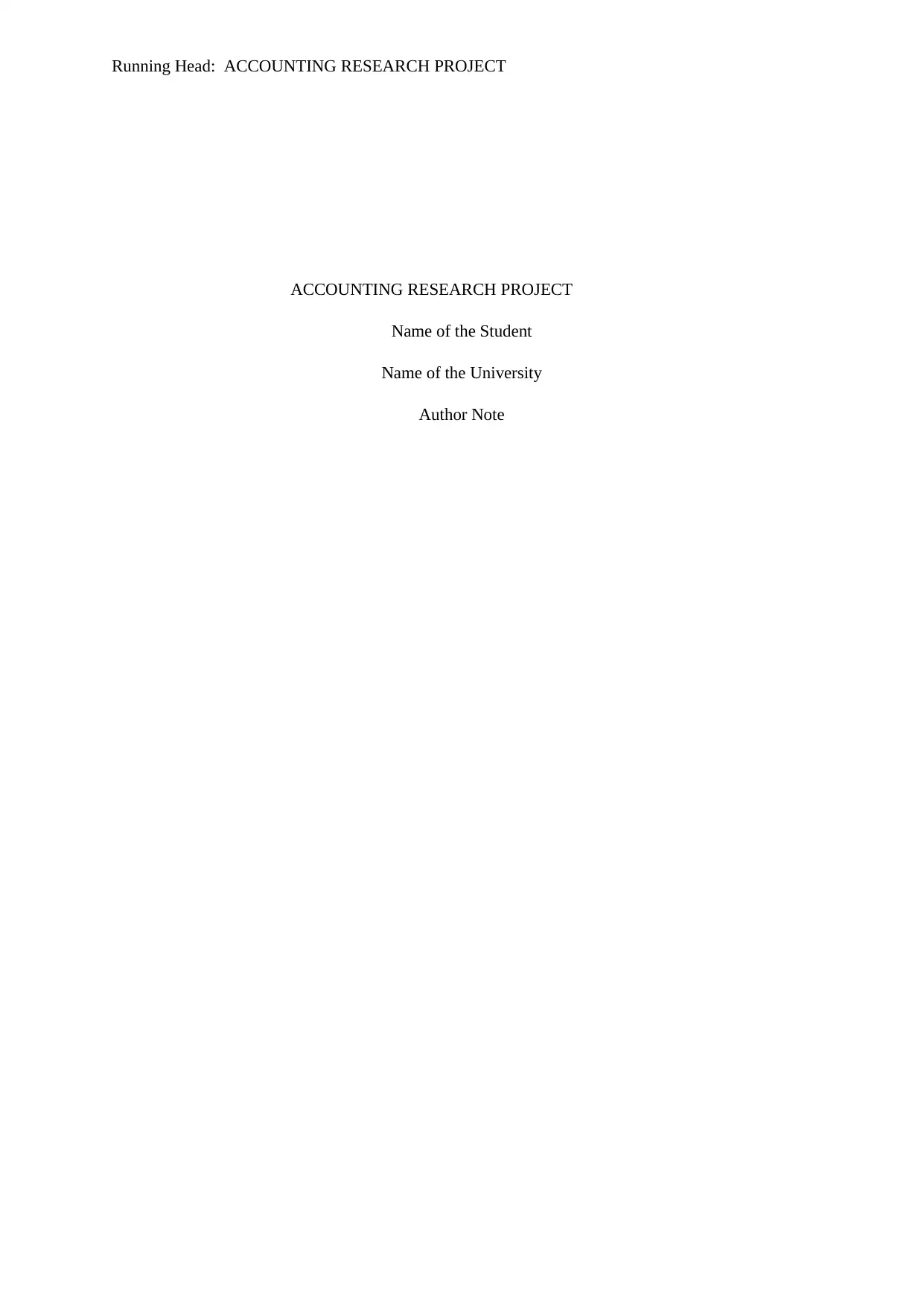
Running Head: ACCOUNTING RESEARCH PROJECT
ACCOUNTING RESEARCH PROJECT
Name of the Student
Name of the University
Author Note
ACCOUNTING RESEARCH PROJECT
Name of the Student
Name of the University
Author Note
Paraphrase This Document
Need a fresh take? Get an instant paraphrase of this document with our AI Paraphraser
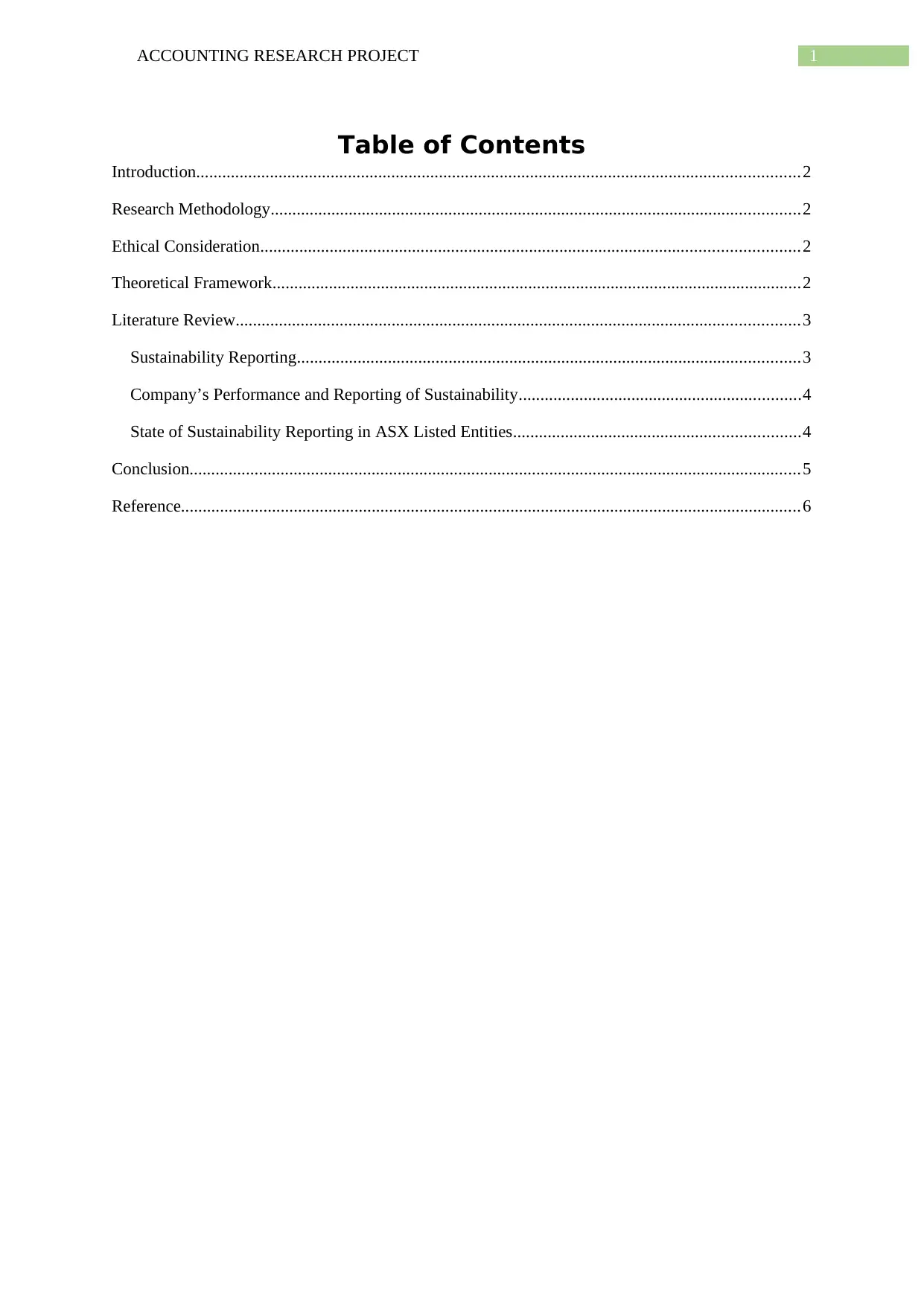
1ACCOUNTING RESEARCH PROJECT
Table of Contents
Introduction...........................................................................................................................................2
Research Methodology..........................................................................................................................2
Ethical Consideration............................................................................................................................2
Theoretical Framework..........................................................................................................................2
Literature Review..................................................................................................................................3
Sustainability Reporting....................................................................................................................3
Company’s Performance and Reporting of Sustainability.................................................................4
State of Sustainability Reporting in ASX Listed Entities..................................................................4
Conclusion.............................................................................................................................................5
Reference...............................................................................................................................................6
Table of Contents
Introduction...........................................................................................................................................2
Research Methodology..........................................................................................................................2
Ethical Consideration............................................................................................................................2
Theoretical Framework..........................................................................................................................2
Literature Review..................................................................................................................................3
Sustainability Reporting....................................................................................................................3
Company’s Performance and Reporting of Sustainability.................................................................4
State of Sustainability Reporting in ASX Listed Entities..................................................................4
Conclusion.............................................................................................................................................5
Reference...............................................................................................................................................6
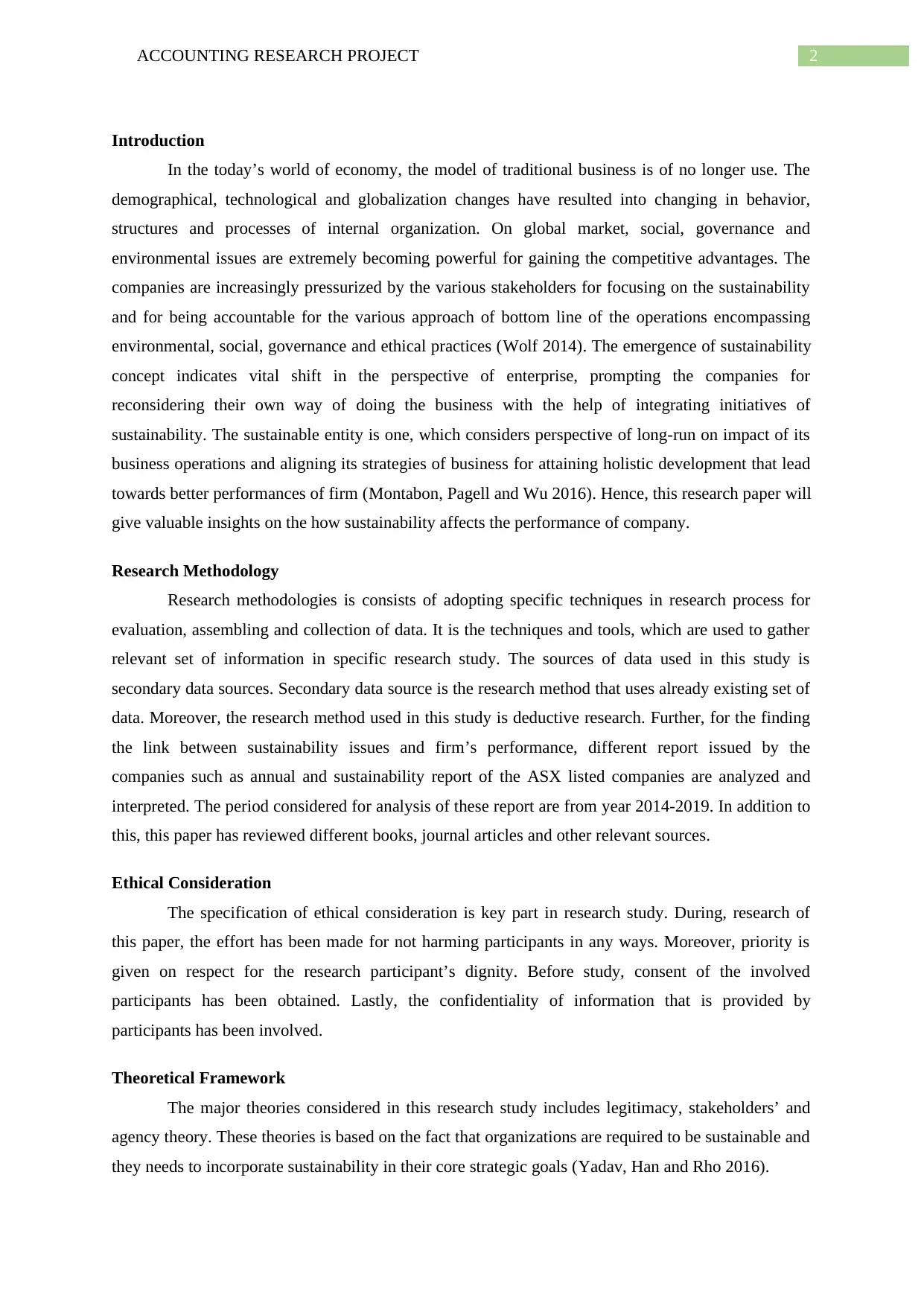
2ACCOUNTING RESEARCH PROJECT
Introduction
In the today’s world of economy, the model of traditional business is of no longer use. The
demographical, technological and globalization changes have resulted into changing in behavior,
structures and processes of internal organization. On global market, social, governance and
environmental issues are extremely becoming powerful for gaining the competitive advantages. The
companies are increasingly pressurized by the various stakeholders for focusing on the sustainability
and for being accountable for the various approach of bottom line of the operations encompassing
environmental, social, governance and ethical practices (Wolf 2014). The emergence of sustainability
concept indicates vital shift in the perspective of enterprise, prompting the companies for
reconsidering their own way of doing the business with the help of integrating initiatives of
sustainability. The sustainable entity is one, which considers perspective of long-run on impact of its
business operations and aligning its strategies of business for attaining holistic development that lead
towards better performances of firm (Montabon, Pagell and Wu 2016). Hence, this research paper will
give valuable insights on the how sustainability affects the performance of company.
Research Methodology
Research methodologies is consists of adopting specific techniques in research process for
evaluation, assembling and collection of data. It is the techniques and tools, which are used to gather
relevant set of information in specific research study. The sources of data used in this study is
secondary data sources. Secondary data source is the research method that uses already existing set of
data. Moreover, the research method used in this study is deductive research. Further, for the finding
the link between sustainability issues and firm’s performance, different report issued by the
companies such as annual and sustainability report of the ASX listed companies are analyzed and
interpreted. The period considered for analysis of these report are from year 2014-2019. In addition to
this, this paper has reviewed different books, journal articles and other relevant sources.
Ethical Consideration
The specification of ethical consideration is key part in research study. During, research of
this paper, the effort has been made for not harming participants in any ways. Moreover, priority is
given on respect for the research participant’s dignity. Before study, consent of the involved
participants has been obtained. Lastly, the confidentiality of information that is provided by
participants has been involved.
Theoretical Framework
The major theories considered in this research study includes legitimacy, stakeholders’ and
agency theory. These theories is based on the fact that organizations are required to be sustainable and
they needs to incorporate sustainability in their core strategic goals (Yadav, Han and Rho 2016).
Introduction
In the today’s world of economy, the model of traditional business is of no longer use. The
demographical, technological and globalization changes have resulted into changing in behavior,
structures and processes of internal organization. On global market, social, governance and
environmental issues are extremely becoming powerful for gaining the competitive advantages. The
companies are increasingly pressurized by the various stakeholders for focusing on the sustainability
and for being accountable for the various approach of bottom line of the operations encompassing
environmental, social, governance and ethical practices (Wolf 2014). The emergence of sustainability
concept indicates vital shift in the perspective of enterprise, prompting the companies for
reconsidering their own way of doing the business with the help of integrating initiatives of
sustainability. The sustainable entity is one, which considers perspective of long-run on impact of its
business operations and aligning its strategies of business for attaining holistic development that lead
towards better performances of firm (Montabon, Pagell and Wu 2016). Hence, this research paper will
give valuable insights on the how sustainability affects the performance of company.
Research Methodology
Research methodologies is consists of adopting specific techniques in research process for
evaluation, assembling and collection of data. It is the techniques and tools, which are used to gather
relevant set of information in specific research study. The sources of data used in this study is
secondary data sources. Secondary data source is the research method that uses already existing set of
data. Moreover, the research method used in this study is deductive research. Further, for the finding
the link between sustainability issues and firm’s performance, different report issued by the
companies such as annual and sustainability report of the ASX listed companies are analyzed and
interpreted. The period considered for analysis of these report are from year 2014-2019. In addition to
this, this paper has reviewed different books, journal articles and other relevant sources.
Ethical Consideration
The specification of ethical consideration is key part in research study. During, research of
this paper, the effort has been made for not harming participants in any ways. Moreover, priority is
given on respect for the research participant’s dignity. Before study, consent of the involved
participants has been obtained. Lastly, the confidentiality of information that is provided by
participants has been involved.
Theoretical Framework
The major theories considered in this research study includes legitimacy, stakeholders’ and
agency theory. These theories is based on the fact that organizations are required to be sustainable and
they needs to incorporate sustainability in their core strategic goals (Yadav, Han and Rho 2016).
⊘ This is a preview!⊘
Do you want full access?
Subscribe today to unlock all pages.

Trusted by 1+ million students worldwide
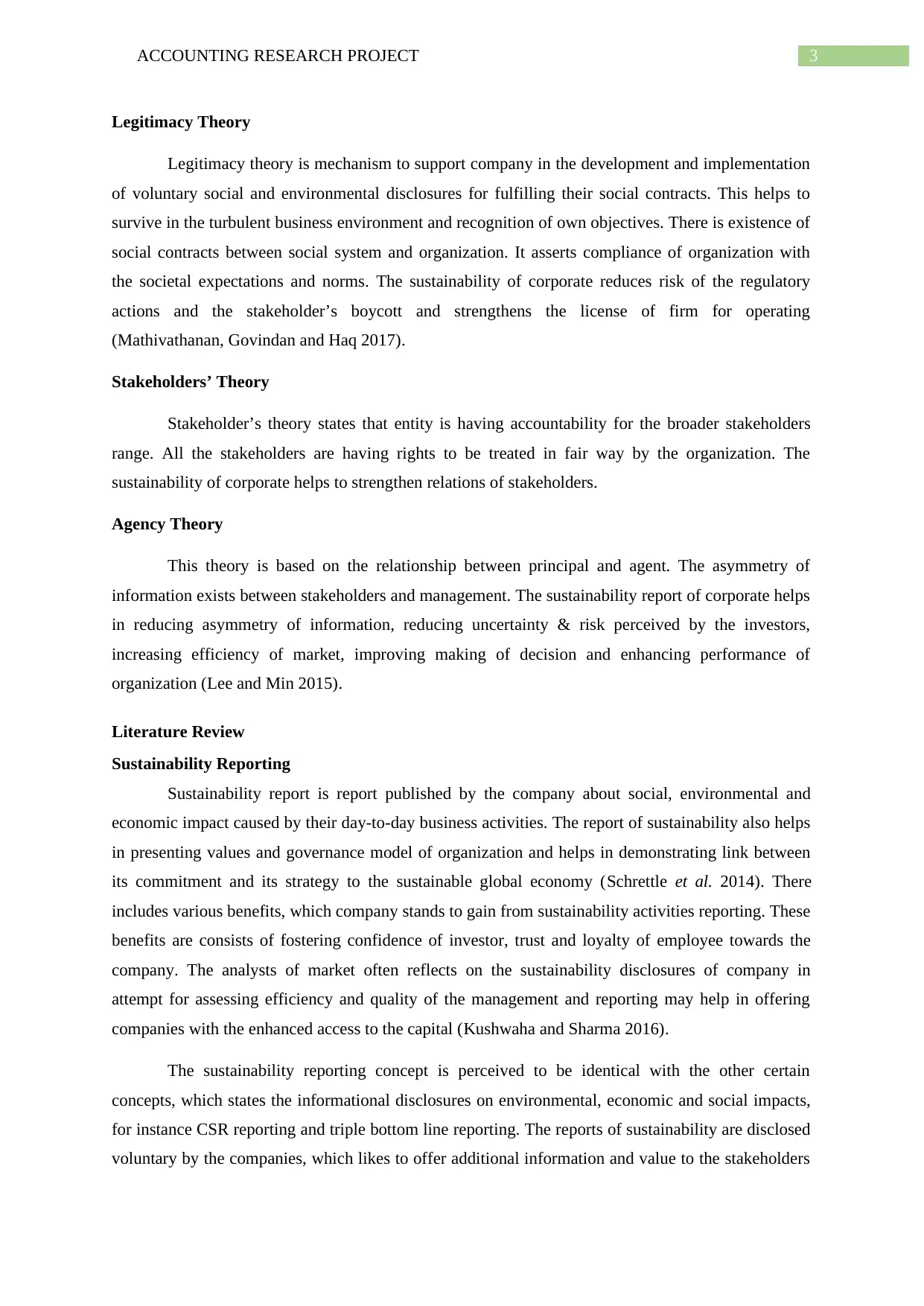
3ACCOUNTING RESEARCH PROJECT
Legitimacy Theory
Legitimacy theory is mechanism to support company in the development and implementation
of voluntary social and environmental disclosures for fulfilling their social contracts. This helps to
survive in the turbulent business environment and recognition of own objectives. There is existence of
social contracts between social system and organization. It asserts compliance of organization with
the societal expectations and norms. The sustainability of corporate reduces risk of the regulatory
actions and the stakeholder’s boycott and strengthens the license of firm for operating
(Mathivathanan, Govindan and Haq 2017).
Stakeholders’ Theory
Stakeholder’s theory states that entity is having accountability for the broader stakeholders
range. All the stakeholders are having rights to be treated in fair way by the organization. The
sustainability of corporate helps to strengthen relations of stakeholders.
Agency Theory
This theory is based on the relationship between principal and agent. The asymmetry of
information exists between stakeholders and management. The sustainability report of corporate helps
in reducing asymmetry of information, reducing uncertainty & risk perceived by the investors,
increasing efficiency of market, improving making of decision and enhancing performance of
organization (Lee and Min 2015).
Literature Review
Sustainability Reporting
Sustainability report is report published by the company about social, environmental and
economic impact caused by their day-to-day business activities. The report of sustainability also helps
in presenting values and governance model of organization and helps in demonstrating link between
its commitment and its strategy to the sustainable global economy (Schrettle et al. 2014). There
includes various benefits, which company stands to gain from sustainability activities reporting. These
benefits are consists of fostering confidence of investor, trust and loyalty of employee towards the
company. The analysts of market often reflects on the sustainability disclosures of company in
attempt for assessing efficiency and quality of the management and reporting may help in offering
companies with the enhanced access to the capital (Kushwaha and Sharma 2016).
The sustainability reporting concept is perceived to be identical with the other certain
concepts, which states the informational disclosures on environmental, economic and social impacts,
for instance CSR reporting and triple bottom line reporting. The reports of sustainability are disclosed
voluntary by the companies, which likes to offer additional information and value to the stakeholders
Legitimacy Theory
Legitimacy theory is mechanism to support company in the development and implementation
of voluntary social and environmental disclosures for fulfilling their social contracts. This helps to
survive in the turbulent business environment and recognition of own objectives. There is existence of
social contracts between social system and organization. It asserts compliance of organization with
the societal expectations and norms. The sustainability of corporate reduces risk of the regulatory
actions and the stakeholder’s boycott and strengthens the license of firm for operating
(Mathivathanan, Govindan and Haq 2017).
Stakeholders’ Theory
Stakeholder’s theory states that entity is having accountability for the broader stakeholders
range. All the stakeholders are having rights to be treated in fair way by the organization. The
sustainability of corporate helps to strengthen relations of stakeholders.
Agency Theory
This theory is based on the relationship between principal and agent. The asymmetry of
information exists between stakeholders and management. The sustainability report of corporate helps
in reducing asymmetry of information, reducing uncertainty & risk perceived by the investors,
increasing efficiency of market, improving making of decision and enhancing performance of
organization (Lee and Min 2015).
Literature Review
Sustainability Reporting
Sustainability report is report published by the company about social, environmental and
economic impact caused by their day-to-day business activities. The report of sustainability also helps
in presenting values and governance model of organization and helps in demonstrating link between
its commitment and its strategy to the sustainable global economy (Schrettle et al. 2014). There
includes various benefits, which company stands to gain from sustainability activities reporting. These
benefits are consists of fostering confidence of investor, trust and loyalty of employee towards the
company. The analysts of market often reflects on the sustainability disclosures of company in
attempt for assessing efficiency and quality of the management and reporting may help in offering
companies with the enhanced access to the capital (Kushwaha and Sharma 2016).
The sustainability reporting concept is perceived to be identical with the other certain
concepts, which states the informational disclosures on environmental, economic and social impacts,
for instance CSR reporting and triple bottom line reporting. The reports of sustainability are disclosed
voluntary by the companies, which likes to offer additional information and value to the stakeholders
Paraphrase This Document
Need a fresh take? Get an instant paraphrase of this document with our AI Paraphraser
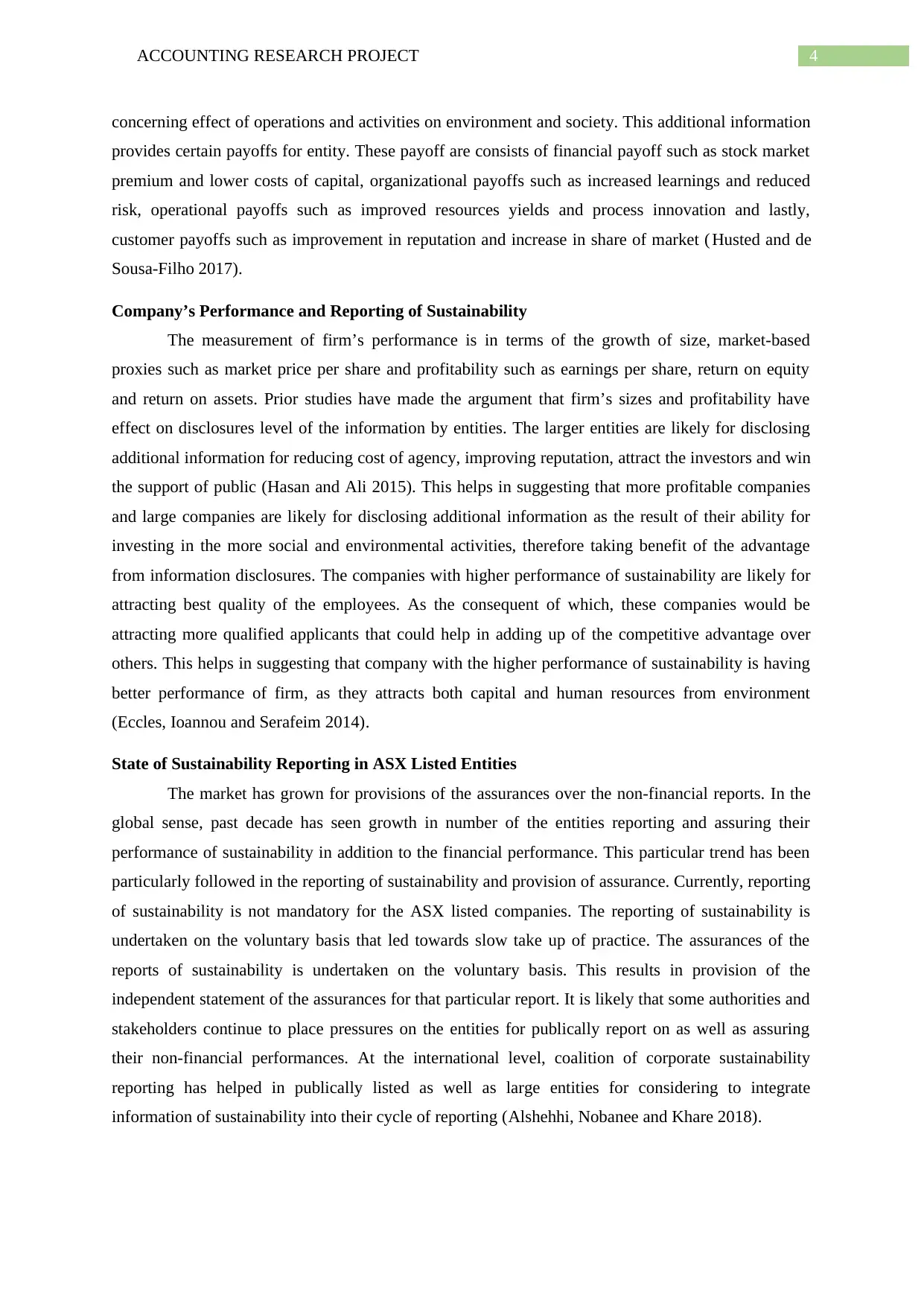
4ACCOUNTING RESEARCH PROJECT
concerning effect of operations and activities on environment and society. This additional information
provides certain payoffs for entity. These payoff are consists of financial payoff such as stock market
premium and lower costs of capital, organizational payoffs such as increased learnings and reduced
risk, operational payoffs such as improved resources yields and process innovation and lastly,
customer payoffs such as improvement in reputation and increase in share of market ( Husted and de
Sousa-Filho 2017).
Company’s Performance and Reporting of Sustainability
The measurement of firm’s performance is in terms of the growth of size, market-based
proxies such as market price per share and profitability such as earnings per share, return on equity
and return on assets. Prior studies have made the argument that firm’s sizes and profitability have
effect on disclosures level of the information by entities. The larger entities are likely for disclosing
additional information for reducing cost of agency, improving reputation, attract the investors and win
the support of public (Hasan and Ali 2015). This helps in suggesting that more profitable companies
and large companies are likely for disclosing additional information as the result of their ability for
investing in the more social and environmental activities, therefore taking benefit of the advantage
from information disclosures. The companies with higher performance of sustainability are likely for
attracting best quality of the employees. As the consequent of which, these companies would be
attracting more qualified applicants that could help in adding up of the competitive advantage over
others. This helps in suggesting that company with the higher performance of sustainability is having
better performance of firm, as they attracts both capital and human resources from environment
(Eccles, Ioannou and Serafeim 2014).
State of Sustainability Reporting in ASX Listed Entities
The market has grown for provisions of the assurances over the non-financial reports. In the
global sense, past decade has seen growth in number of the entities reporting and assuring their
performance of sustainability in addition to the financial performance. This particular trend has been
particularly followed in the reporting of sustainability and provision of assurance. Currently, reporting
of sustainability is not mandatory for the ASX listed companies. The reporting of sustainability is
undertaken on the voluntary basis that led towards slow take up of practice. The assurances of the
reports of sustainability is undertaken on the voluntary basis. This results in provision of the
independent statement of the assurances for that particular report. It is likely that some authorities and
stakeholders continue to place pressures on the entities for publically report on as well as assuring
their non-financial performances. At the international level, coalition of corporate sustainability
reporting has helped in publically listed as well as large entities for considering to integrate
information of sustainability into their cycle of reporting (Alshehhi, Nobanee and Khare 2018).
concerning effect of operations and activities on environment and society. This additional information
provides certain payoffs for entity. These payoff are consists of financial payoff such as stock market
premium and lower costs of capital, organizational payoffs such as increased learnings and reduced
risk, operational payoffs such as improved resources yields and process innovation and lastly,
customer payoffs such as improvement in reputation and increase in share of market ( Husted and de
Sousa-Filho 2017).
Company’s Performance and Reporting of Sustainability
The measurement of firm’s performance is in terms of the growth of size, market-based
proxies such as market price per share and profitability such as earnings per share, return on equity
and return on assets. Prior studies have made the argument that firm’s sizes and profitability have
effect on disclosures level of the information by entities. The larger entities are likely for disclosing
additional information for reducing cost of agency, improving reputation, attract the investors and win
the support of public (Hasan and Ali 2015). This helps in suggesting that more profitable companies
and large companies are likely for disclosing additional information as the result of their ability for
investing in the more social and environmental activities, therefore taking benefit of the advantage
from information disclosures. The companies with higher performance of sustainability are likely for
attracting best quality of the employees. As the consequent of which, these companies would be
attracting more qualified applicants that could help in adding up of the competitive advantage over
others. This helps in suggesting that company with the higher performance of sustainability is having
better performance of firm, as they attracts both capital and human resources from environment
(Eccles, Ioannou and Serafeim 2014).
State of Sustainability Reporting in ASX Listed Entities
The market has grown for provisions of the assurances over the non-financial reports. In the
global sense, past decade has seen growth in number of the entities reporting and assuring their
performance of sustainability in addition to the financial performance. This particular trend has been
particularly followed in the reporting of sustainability and provision of assurance. Currently, reporting
of sustainability is not mandatory for the ASX listed companies. The reporting of sustainability is
undertaken on the voluntary basis that led towards slow take up of practice. The assurances of the
reports of sustainability is undertaken on the voluntary basis. This results in provision of the
independent statement of the assurances for that particular report. It is likely that some authorities and
stakeholders continue to place pressures on the entities for publically report on as well as assuring
their non-financial performances. At the international level, coalition of corporate sustainability
reporting has helped in publically listed as well as large entities for considering to integrate
information of sustainability into their cycle of reporting (Alshehhi, Nobanee and Khare 2018).
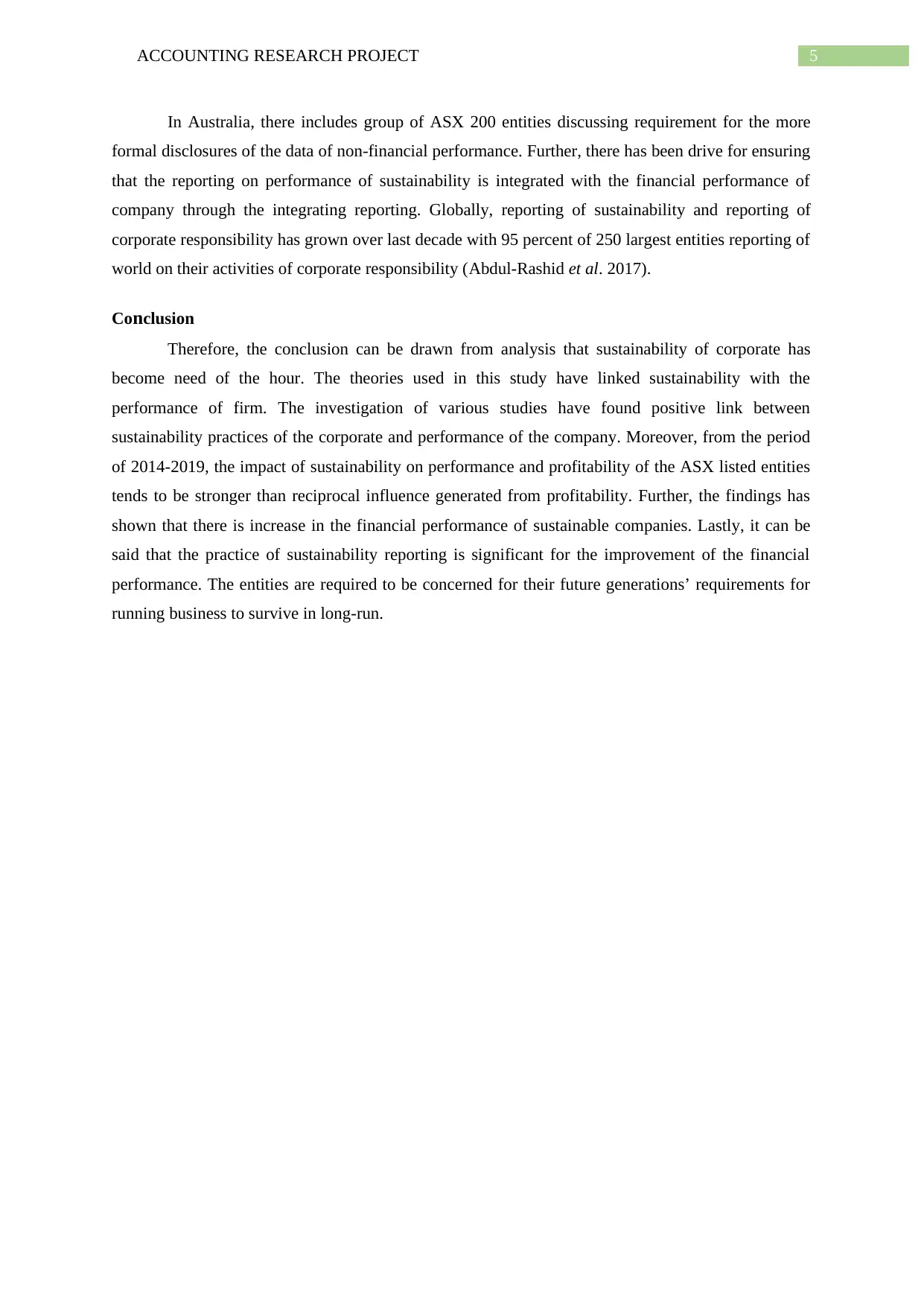
5ACCOUNTING RESEARCH PROJECT
In Australia, there includes group of ASX 200 entities discussing requirement for the more
formal disclosures of the data of non-financial performance. Further, there has been drive for ensuring
that the reporting on performance of sustainability is integrated with the financial performance of
company through the integrating reporting. Globally, reporting of sustainability and reporting of
corporate responsibility has grown over last decade with 95 percent of 250 largest entities reporting of
world on their activities of corporate responsibility (Abdul-Rashid et al. 2017).
Conclusion
Therefore, the conclusion can be drawn from analysis that sustainability of corporate has
become need of the hour. The theories used in this study have linked sustainability with the
performance of firm. The investigation of various studies have found positive link between
sustainability practices of the corporate and performance of the company. Moreover, from the period
of 2014-2019, the impact of sustainability on performance and profitability of the ASX listed entities
tends to be stronger than reciprocal influence generated from profitability. Further, the findings has
shown that there is increase in the financial performance of sustainable companies. Lastly, it can be
said that the practice of sustainability reporting is significant for the improvement of the financial
performance. The entities are required to be concerned for their future generations’ requirements for
running business to survive in long-run.
In Australia, there includes group of ASX 200 entities discussing requirement for the more
formal disclosures of the data of non-financial performance. Further, there has been drive for ensuring
that the reporting on performance of sustainability is integrated with the financial performance of
company through the integrating reporting. Globally, reporting of sustainability and reporting of
corporate responsibility has grown over last decade with 95 percent of 250 largest entities reporting of
world on their activities of corporate responsibility (Abdul-Rashid et al. 2017).
Conclusion
Therefore, the conclusion can be drawn from analysis that sustainability of corporate has
become need of the hour. The theories used in this study have linked sustainability with the
performance of firm. The investigation of various studies have found positive link between
sustainability practices of the corporate and performance of the company. Moreover, from the period
of 2014-2019, the impact of sustainability on performance and profitability of the ASX listed entities
tends to be stronger than reciprocal influence generated from profitability. Further, the findings has
shown that there is increase in the financial performance of sustainable companies. Lastly, it can be
said that the practice of sustainability reporting is significant for the improvement of the financial
performance. The entities are required to be concerned for their future generations’ requirements for
running business to survive in long-run.
⊘ This is a preview!⊘
Do you want full access?
Subscribe today to unlock all pages.

Trusted by 1+ million students worldwide
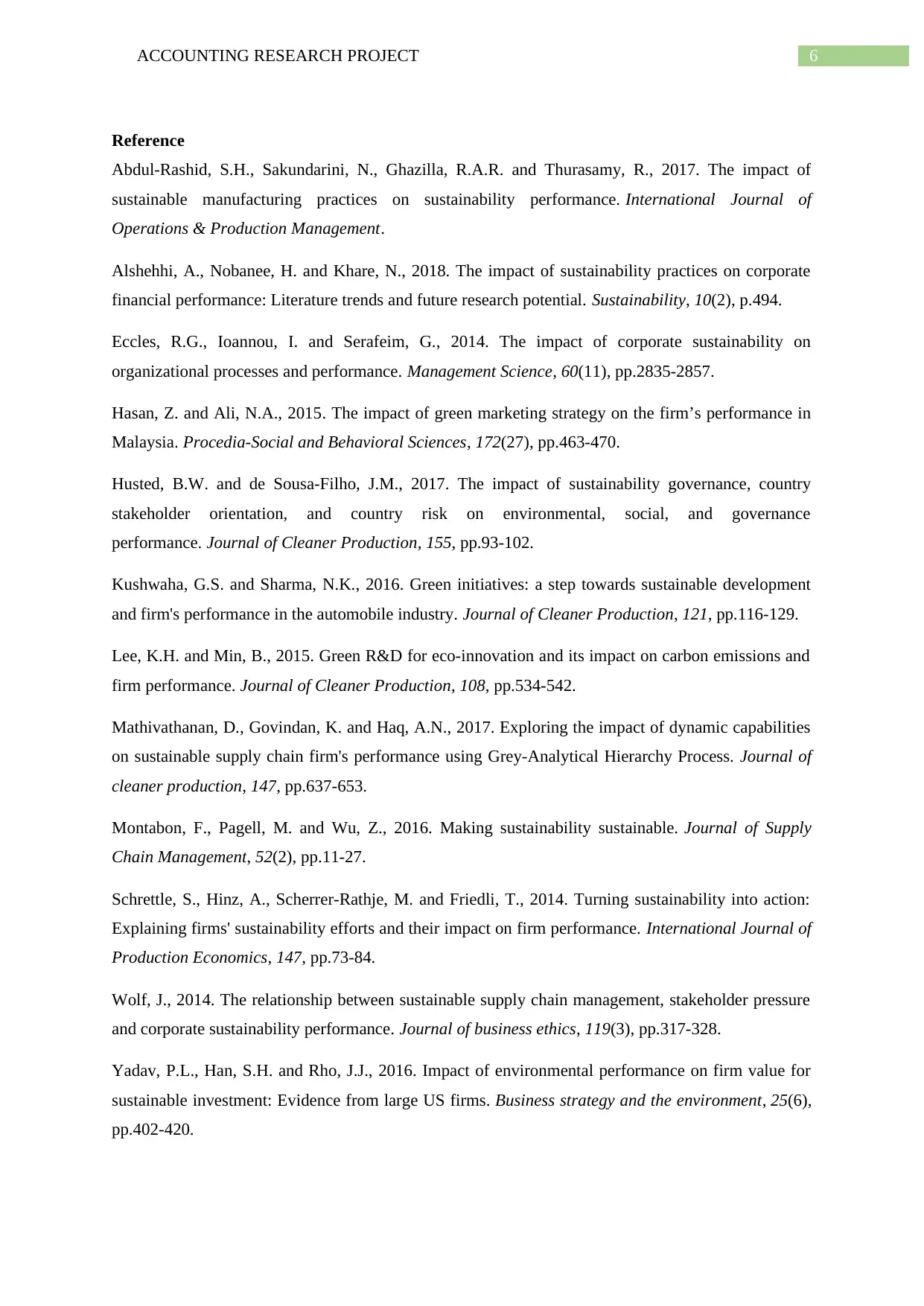
6ACCOUNTING RESEARCH PROJECT
Reference
Abdul-Rashid, S.H., Sakundarini, N., Ghazilla, R.A.R. and Thurasamy, R., 2017. The impact of
sustainable manufacturing practices on sustainability performance. International Journal of
Operations & Production Management.
Alshehhi, A., Nobanee, H. and Khare, N., 2018. The impact of sustainability practices on corporate
financial performance: Literature trends and future research potential. Sustainability, 10(2), p.494.
Eccles, R.G., Ioannou, I. and Serafeim, G., 2014. The impact of corporate sustainability on
organizational processes and performance. Management Science, 60(11), pp.2835-2857.
Hasan, Z. and Ali, N.A., 2015. The impact of green marketing strategy on the firm’s performance in
Malaysia. Procedia-Social and Behavioral Sciences, 172(27), pp.463-470.
Husted, B.W. and de Sousa-Filho, J.M., 2017. The impact of sustainability governance, country
stakeholder orientation, and country risk on environmental, social, and governance
performance. Journal of Cleaner Production, 155, pp.93-102.
Kushwaha, G.S. and Sharma, N.K., 2016. Green initiatives: a step towards sustainable development
and firm's performance in the automobile industry. Journal of Cleaner Production, 121, pp.116-129.
Lee, K.H. and Min, B., 2015. Green R&D for eco-innovation and its impact on carbon emissions and
firm performance. Journal of Cleaner Production, 108, pp.534-542.
Mathivathanan, D., Govindan, K. and Haq, A.N., 2017. Exploring the impact of dynamic capabilities
on sustainable supply chain firm's performance using Grey-Analytical Hierarchy Process. Journal of
cleaner production, 147, pp.637-653.
Montabon, F., Pagell, M. and Wu, Z., 2016. Making sustainability sustainable. Journal of Supply
Chain Management, 52(2), pp.11-27.
Schrettle, S., Hinz, A., Scherrer-Rathje, M. and Friedli, T., 2014. Turning sustainability into action:
Explaining firms' sustainability efforts and their impact on firm performance. International Journal of
Production Economics, 147, pp.73-84.
Wolf, J., 2014. The relationship between sustainable supply chain management, stakeholder pressure
and corporate sustainability performance. Journal of business ethics, 119(3), pp.317-328.
Yadav, P.L., Han, S.H. and Rho, J.J., 2016. Impact of environmental performance on firm value for
sustainable investment: Evidence from large US firms. Business strategy and the environment, 25(6),
pp.402-420.
Reference
Abdul-Rashid, S.H., Sakundarini, N., Ghazilla, R.A.R. and Thurasamy, R., 2017. The impact of
sustainable manufacturing practices on sustainability performance. International Journal of
Operations & Production Management.
Alshehhi, A., Nobanee, H. and Khare, N., 2018. The impact of sustainability practices on corporate
financial performance: Literature trends and future research potential. Sustainability, 10(2), p.494.
Eccles, R.G., Ioannou, I. and Serafeim, G., 2014. The impact of corporate sustainability on
organizational processes and performance. Management Science, 60(11), pp.2835-2857.
Hasan, Z. and Ali, N.A., 2015. The impact of green marketing strategy on the firm’s performance in
Malaysia. Procedia-Social and Behavioral Sciences, 172(27), pp.463-470.
Husted, B.W. and de Sousa-Filho, J.M., 2017. The impact of sustainability governance, country
stakeholder orientation, and country risk on environmental, social, and governance
performance. Journal of Cleaner Production, 155, pp.93-102.
Kushwaha, G.S. and Sharma, N.K., 2016. Green initiatives: a step towards sustainable development
and firm's performance in the automobile industry. Journal of Cleaner Production, 121, pp.116-129.
Lee, K.H. and Min, B., 2015. Green R&D for eco-innovation and its impact on carbon emissions and
firm performance. Journal of Cleaner Production, 108, pp.534-542.
Mathivathanan, D., Govindan, K. and Haq, A.N., 2017. Exploring the impact of dynamic capabilities
on sustainable supply chain firm's performance using Grey-Analytical Hierarchy Process. Journal of
cleaner production, 147, pp.637-653.
Montabon, F., Pagell, M. and Wu, Z., 2016. Making sustainability sustainable. Journal of Supply
Chain Management, 52(2), pp.11-27.
Schrettle, S., Hinz, A., Scherrer-Rathje, M. and Friedli, T., 2014. Turning sustainability into action:
Explaining firms' sustainability efforts and their impact on firm performance. International Journal of
Production Economics, 147, pp.73-84.
Wolf, J., 2014. The relationship between sustainable supply chain management, stakeholder pressure
and corporate sustainability performance. Journal of business ethics, 119(3), pp.317-328.
Yadav, P.L., Han, S.H. and Rho, J.J., 2016. Impact of environmental performance on firm value for
sustainable investment: Evidence from large US firms. Business strategy and the environment, 25(6),
pp.402-420.
1 out of 7
Related Documents
Your All-in-One AI-Powered Toolkit for Academic Success.
+13062052269
info@desklib.com
Available 24*7 on WhatsApp / Email
![[object Object]](/_next/static/media/star-bottom.7253800d.svg)
Unlock your academic potential
Copyright © 2020–2026 A2Z Services. All Rights Reserved. Developed and managed by ZUCOL.





